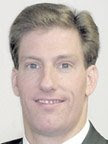The CS&T ran a story last year that referred to a study of academic achievement in our Catholic schools. Seemed like a nice, positive piece about Catholic education.
One reader took high offense at our failure to list the science behind the study – “what was the standard deviation of the sampling group?” and so on.
Just goes to show you can’t please everybody in this business. It also leads one to suspect that online polls, which seem to be on every web site these days, are not supported by rock-solid empirical evidence. They’re part diversion (isn’t that the purpose of the Internet?) and part window into people’s thinking.
In the spirit of the latter and with a cavalier attitude for data mining, our web site at cst-phl.com has been running polls for close to a year now. The sampling is small, normally less than 200 votes cast over a four-week period, but one can learn a lot about the mindset of visitors who took the time to weigh in.
A poll we ran this summer concerned immigration, and it was enlightening. The question was, “The bishops of North and Central America are calling for a summit to discuss migration issues. What do you think?”
Of the five sample answers, the leading one chosen was, “The bishops should only speak about just treatment of people, not immigration laws.” (40 percent of the 131 votes). The other answers ran the gamut from expressing the desire for the bishops to lead the immigration policy debate (30 percent), to the view that current U.S. immigration law should be enforced, and other countries and their bishops ought to stay out of American affairs (20 percent).
In sum, most respondents to our poll (60 percent) not only disagree with the American Catholic bishops’ teaching on immigration – that the stranger should be welcomed and current law must be reformed – they don’t think the bishops should even weigh in on the issue.
How often do we see a disconnect in the Church between her members and her teaching? It seems that many people misplace the truth of Church teaching, based on Scripture, the tradition of the Church and the teachings of her magisterium, for a certain political view. How can it be that members of the Body of Christ choose one teaching or another that they support in full throat, while conveniently assigning others to the periphery?
You’ve heard them: “This one is a core teaching. That one is a political issue which the Church should avoid.”
The Church needs discipline, which is another way of saying obedience. Even the disciples in the Gospels grumbled at Jesus’ words: “This is a hard teaching. Who can accept it?” Nevertheless, the truth of human dignity and mankind’s relationship with God serves as the foundation for all Church teaching.
We do not get to pick and choose. We do get the opportunity to study and reflect upon the teaching, even if it is hard to accept at this time.
While we are reflecting, open to the will of the Spirit to illuminate us with the light of truth, couldn’t we at least accept that the successors of the apostles, the bishops, have the right to teach in public, and that Church teaching deserves a hearing in the heart?
Monday, August 10, 2009
Subscribe to:
Post Comments (Atom)

No comments:
Post a Comment